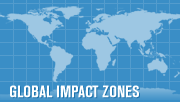Studies of the Arctic suggest a dire situation
A study published in the September 4th, 2009 edition of Science indicates that human beings have had a significant impact on arctic temperatures, as discussed in Bryan Walsh’s article for TIME.
· Arctic warming is a new phenomenon that began in the 20th century
· Arctic sea ice is melting at a faster rate than expected
· The most recent decade (1998 – 2008) was the warmest of the past 2,000 years
An excerpt of the article is below. Read the full article at TIME.
Studies of the Arctic Suggest a Dire Situation
By Bryan Walsh
TIME Magazine, September 5 2009
Climate change is happening everywhere, but nowhere faster than in the Arctic, where annual temperatures in the far North are warming twice as fast as the rest of the globe. Sea ice on the polar cap is shrinking and permafrost is melting, putting animals like the polar bear — and the Arctic people who depend on them — in increasing danger.
While there's no doubt that the Arctic is warming — year after year, it becomes more clearly visible — it is actually a new phenomenon. In a new study published in the Sept. 4 Science, researchers led by Darrell Kaufman at Northern Arizona University and the National Center for Atmospheric Research constructed a climate record of the Arctic over the past 2,000 years, and found that the region had been cooling for almost all of that time period. Summer temperatures in the Arctic cooled by an average of 0.2 degrees C each thousand years, thanks chiefly to wobbles in the Earth's orbit around the sun that gradually reduced the amount of sunlight hitting the Arctic. Left unchecked, the Arctic would have continued that slow cooling for thousands of more years, until the Earth's orbit wobbled again.
But then something else happened — us. The Science researchers found that during the 20th century, as human beings began pouring greenhouse gases into the atmosphere, the Arctic stopped cooling and started warming. Even though the Arctic is still gradually getting less sunlight, it's still getting hotter — summer temperatures in the Arctic are 1.4 degrees C higher than they would have been if the cooling had continued unabated, according to the study. The most recent decade recorded — from 1999 to 2008 — was the warmest of the past 2,000 years. The recent warming trend has been so strong that researchers say it might have even kept the Earth from slipping into a new Ice Age — although now, of course, the world needs to deal with the opposite problem.
Read the full article at TIME.



